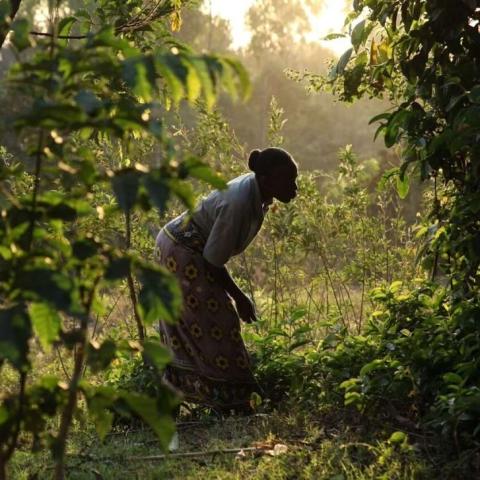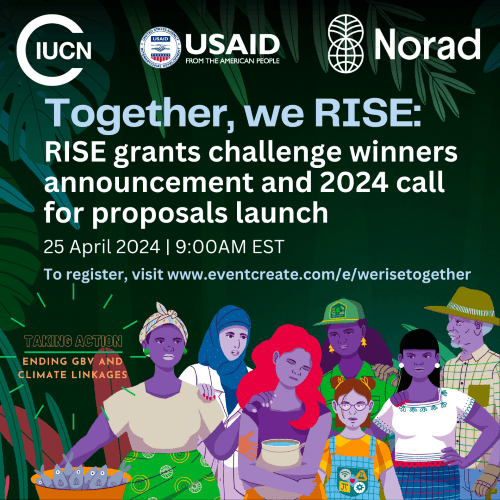Gender-based violence & the environment: apply for a RISE grant

Organised by USAID and IUCN.
The Resilient, Inclusive and Sustainable Environments (RISE) grants challenge is the first-of-its-kind to address gender-based violence (GBV) in environment contexts and climate-related sectors. The initiative is hosting two events: learn about successful projects, and apply for funding for your own project.
Background
Gender-based violence is used across environment sectors to assert control over land and natural resources. It can be exacerbated in the context of degradation and biodiversity loss caused by climate change, extractive industries and environmental crimes. Women environmental human rights defenders are especially at risk, as a study by IUCN shows. At the same time, IUCN data shows that "gender equality and women’s empowerment are essential for global goals on achieving an inclusive and sustainable future."
Event 2: How to apply to the RISE grants challenge
9 May 2024, 15:00 CEST
In 2024, the RISE grants challenge seeks proposals that adopt strategies to prevent, mitigate and respond to the risk of gender-based violence and environmental linkages in the context of the dual global biodiversity and climate crises, with a specific earmark for projects addressing gender-based violence in the fisheries sector.
The RISE grants challenge is funded by USAID and Norad and implemented through the USAID partnership with IUCN on Advancing Gender in the Environment (AGENT), and in complement with its gender-based violence and environment linkages center (GBV-ENV Center). As part of the GBV-ENV Center webinar series, this webinar aims to provide guidance for those interested in applying to the RISE grants challenge, and answer any questions that they may have.
Event 1: Grants challenge winners announcement and 2024 call for proposals launch
Update: You can watch a recording of the event on YouTube. There is also a short video on the winners of the 2023 call.

25 April 2024, 15:00 CEST
The virtual event will:
- Elevate attention to addressing gender-based violence and environment linkages.
- Announce the RISE grants challenge winners who applied for grants in 2023, who will be sharing first-hand stories and their proposed interventions to prevent and respond to gender-based violence and environment linkages within the context of climate change.
- Launch a new open call for 2024 proposals for applications that address gender-based violence and environmental linkages in the context of the dual global biodiversity and climate crises, including projects addressing gender-based violence in fisheries.
About the organisers
IUCN
Created in 1948, IUCN is now the world’s largest and most diverse environmental network, harnessing the knowledge, resources and reach of our more than 1,400 Member organisations and 16,000 experts. This diversity and expertise makes IUCN the global authority on the status of the natural world and the measures needed to safeguard it.
IUCN supports ONet, and is an IPBES observer organisation and strategic partner.
USAID
In support of America's foreign policy, the U.S. Agency for International Development leads the U.S. Government's international development and disaster assistance through partnerships and investments that save lives, reduce poverty, strengthen democratic governance, and help people emerge from humanitarian crises and progress beyond assistance.
Photo by Elisabetta Demartis via Bioversity International on Flickr: Evening sets in a Kenyan family farm. It is evening in Kakamega and Beatrice, a Kenyan widow farmer is working in her garden where she grows local medicinal herbs, some green vegetables and potatoes. She leads a local self-help group, where farmers support each other by finding markets to sell their products and sustain their families. The women in Kenya practice family farming, and are the ones in charge of feeding the family and taking care of the farm. This photo was submitted to Bioversity International's photo contest 'Women and Agricultural Biodiversity'.
